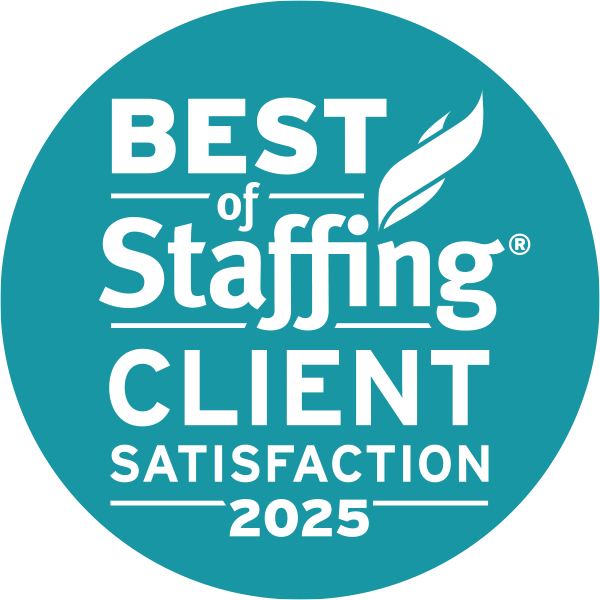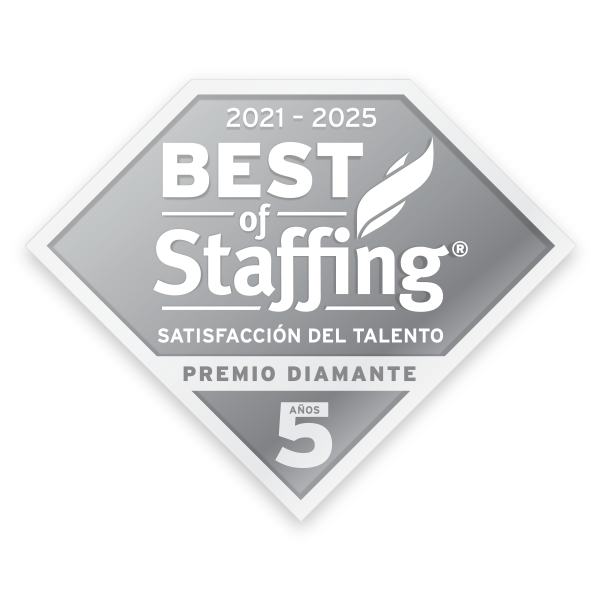
Over 30% of Google’s code was written with AI. Creative teams are using AI to cut design time by over 50%. And Forever 21’s AI-enhanced ad campaign achieved a 66% higher ROI. The list of AI achievements is rapidly growing, but the truth is: AI gets too much credit.
These accomplishments aren’t just a demonstration of the technology’s capabilities; they’re a testament to the talent behind the tools. Without AI-skilled professionals, few of AI’s achievements would be possible. Today’s AI is only as great as its users, and hiring managers across industries recognize it.
71% of leaders now value AI skills over traditional job experience. Yet, AI continues to evolve more quickly than most professionals can adapt. Over 50% of companies say their teams don’t have the AI skills to bring their strategies to life, and that number isn’t shrinking; it’s growing. To adapt, leaders must understand the value of AI-Skilled talent, what that actually means, and how companies are responding as they race to future-proof their teams.
Why Every Team Needs AI-Skilled Talent
With AI capabilities reportedly doubling every 7 months, no discipline is immune to AI’s disruption. To stay competitive, companies across industries need to act quickly. Yet, overreliance and misuse can be just as damaging as inaction.

Over 1,200 websites have now been called out for publishing false or low-quality AI-generated articles. Even major brands have received backlash for imperfections in AI videos and imagery. And AI isn’t just being leveraged for content creation; it’s increasingly being used and misused across functions.
There’s no question that today’s technology has its limitations, and not every tool works well for every task. But if you’ve noticed the rise in robotic voices, nonsensical images, and low-effort AI work or “AI slop” — don’t blame the tools; critique the team.
It’s up to your workforce to ensure your AI outputs meet standards. That responsibility demands strong talent. In fact, 91% agree that your talent matters more than your tech. And the benefits of AI-skilled professionals far exceed quality control: they do better work, they accomplish more faster, and they drive cost savings in the process.
Unfortunately, 73% of companies looking for AI-skilled professionals are struggling to vet them properly, and most teams simply aren’t using AI tools to their potential. Common issues include poor prompting, skipping iteration, and relying on AI with little to no human oversight.
91% agree that your talent matters more than your tech.
What AI-Skilled Talent Really Means
81% of professionals now say they perform better with AI, but only a small minority would consider themselves to be skilled users.
Recognizing the need for professionals with AI skills, the United States government recently declared AI literacy a national imperative.
The executive order extends beyond educating aspiring AI engineers and developers. It’s about empowering the next generation of workers to use AI effectively and efficiently. And companies should take a similar approach with their teams.
However, the challenge isn’t just that people lack knowledge about AI best practices; it’s that teams lack professionals who’ve truly mastered their fields of work. To win in an AI world, employees across disciplines must be:
1. Experts in Their AI Tools
While not every jobseeker and hiring manager has realized it, nearly every job is now an AI prompting job. And every expert must become an AI expert. To succeed, teams need to know the AI tools of their trade and how to use them.
That doesn’t mean everyone should rely solely on AI to get work done; it means that everyone needs to learn to use AI to elevate and accelerate their work. Today’s top job candidates are the ones who can direct AI, delegate responsibilities, and fine-tune outputs successfully.
This isn’t just about learning which tools to use and the tricks for working with them; it’s about honing leadership skills that are pertinent to partnering with AI tools and human talent alike.
2. Masters of Their Fields
Not every AI user is an expert in the field they’re using AI for — but the best people know their discipline as well as the tools.
While the technology empowers AI users to fulfill some responsibilities of others, AI doesn’t turn novices into experts. Writers write with AI best. Designers design with AI best. Coders code with AI best. And across professions, people with deep experience and natural skills prevail.
Hiring AI generalists who use the tools to do a little of everything will only get you so far. Be sure to hire specialists as well to combine talent with technology and drive exceptional results.
Nearly every job is now an AI prompting job.
How Teams Approach AI-Skilled Talent
While many companies compete for experts in AI tools and masters of their fields — different companies are responding to AI’s disruption in different ways. Some are embracing the technology fully and taking the lead while others have yet to enter the race.
As 2025 continues, there are four approaches that teams are taking to AI-skilled talent:
1. Prohibit & Resist
There are still companies banning generative AI tools outright, looking for masters of their fields but not AI-skilled professionals. This group remains surprisingly substantial and impassioned, but it’s increasingly shrinking — even among creative and finance teams.
The reasons behind bans range from preserving creativity and integrity to protecting data, intellectual property, and privileged information. These concerns are all valid, but research shows the approach is flawed. The average ROI of generative AI is $3.7 for every $1 invested.
In the right hands, it unquestionably elevates and accelerates work. When used properly, AI technologies amplify creativity. Plus, AI companies and responsible users are setting up safeguards to protect data and prevent leaks. The solution isn’t resisting innovation; it’s hiring the right people, adopting the right tools, and putting the right policies in place.
2. Wait & See
Many companies recognize the value of AI but haven’t yet made a meaningful effort to adopt it. While this isn’t widely believed to be an effective approach, it remains a common one — especially among small and mid-sized organizations with limited resources.
Some are making a conscious choice to wait, believing the technology is moving too fast to adopt. Others are overwhelmed and don’t know where to start. They might be exploring options but they aren’t yet taking action.
Meanwhile, their competitors are moving forward. And the more AI advances, the more they’re missing out. The time to act isn’t tomorrow or today; it was yesterday.
3. Move Forward Slowly
Across numerous studies, most companies say they have taken steps toward adoption, but they’re not yet where they need to be.
Some are over-relying on the technology, while others are proceeding so cautiously that it’s preventing progress. Whether they’re experimenting with AI tools, hiring for AI-skilled talent, or engaging a consultant — they’re early in their AI journey.
They’ve begun to use the technology or work toward it. However, few have formal policies. Fewer are leveraging AI consistently across teams. And none in this group are seeing full returns on their investment yet.
4. Reach Maturity Quickly
Only 1% of companies have reached full AI maturity — and many that think they have, haven’t. For the companies truly in this category, AI adoption isn’t an aspiration; it’s an accomplishment.
They have formal AI policies, education programs in place, a range of AI tools at their disposal, and teams of AI-skilled employees. Many of these organizations are even investing in Chief AI Officers or equivalent roles to lead and maintain their efforts.
Today, AI-ready companies are paying a premium of up to 25% to secure the talent needed to maintain their edge. And competitors are doing the same in an effort to keep up. But AI literacy is quickly becoming the expectation across professions and organizations.
Only 1% of companies have reached full AI maturity.
Final Thoughts
 Two-thirds of leaders now say they wouldn’t hire someone without AI skills. Job postings requiring AI skills grow 3.5x faster than all others. And there’s a rising pressure for nations and organizations to embrace AI, as competitors race to do the same.
Two-thirds of leaders now say they wouldn’t hire someone without AI skills. Job postings requiring AI skills grow 3.5x faster than all others. And there’s a rising pressure for nations and organizations to embrace AI, as competitors race to do the same.
Still, many AI users continue to produce poor and mediocre results. Some lack knowledge of AI best practices; others lack specialized expertise in their discipline. Whether you’re underutilizing your tools, overestimating their capabilities, or simply waiting too long to act, the answer is no different: you need AI-skilled talent.
Resistance isn’t a strategy. Delay isn’t a plan. To thrive in an AI world, you need to invest in AI tech, training, and talent alike. The companies that win aren’t just embracing innovation; they’re empowering the right people to lead the way.
 Win in an AI World
Win in an AI World
We help top companies find AI-skilled professionals, upskill creative teams, and engage strategic consultants. Partner with us to power AI adoption, creative excellence, and most importantly, revenue growth.
Request AI-Skilled Talent or Training
Request services or additional information. We’ll respond within 24 hours to support you.









